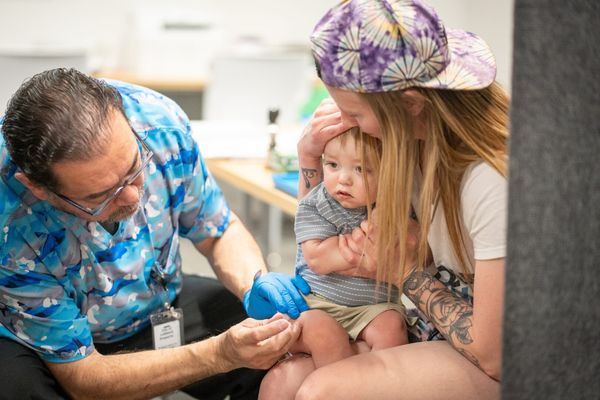Two months ago, Emily Pellegrini was living the dream.
Between holidaying across the European coast to fielding advances from famous footballers, boxers and billionaires, the popular content creator (who once boasted over 200,000 followers) had been busy building a lucrative career.
But despite bringing in thousands of dollars every week, Pellegrini never saw a cent of her earnings.
No, the social media star hasn’t been swindled out of her riches or undercut by the creator fund. Instead, the reason the influencer won’t be pocketing any of her pay cheques, is because Pellegrini doesn’t really exist.

Pellegrini is part of a growing industry of AI generated influencers, who have been artificially constructed to pose as social media models.
“I asked Chat GPT ‘what’s the average man’s dream girl?’ and it said brown hair long and long legs, so I made her exactly how it said. ‘The goal was to make her likeable and attractive. I wanted to keep her as real as possible. [People] think she is real. They invite her to Dubai to meet and eat at a great restaurants,” said the anonymous creator behind Pellegrini’s infamous avatar.
While AI models have been used in campaigns for luxury fashion houses, including Louis Vuitton, Balenciaga and Calvin Klein for close to a decade, artificial models are now being manipulated for a more sinister purpose.
A recent investigation conducted by the ABC revealed AI ‘pimps’ have been targeting high profile model and influencers to harvest their images without consent to create ‘deepfakes’ disguised as influencers, who are then pushing their audiences to purchase porn subscriptions.
What Are Deepfakes?
The dark reality of deepfakes (fake images, videos, or audio created using AI) is that even if you have never heard the term, you’ve likely already watched, shared or interacted with one.
First popularised by a 2017 Reddit thread linking to a series of fake celebrity sex tapes, the term “deepfakes” has crawled from the dark corners of the internet to the forefront of mainstream media, blurring the boundaries between fact and fiction.
While a deepfake video of a wide-eyed Tom Cruise laughing unnervingly might seem perfectly harmless, the stark reality is that up to 97 per cent of deepfakes are of non-consensual porn.
What Are AI Pimps And Why Are They Dangerous?
No longer confided to the shadows of a street corner, AI pimps are able to sell sex from the comfort of their homes.
Behind the anonymity of their keyboards, digitally savvy ‘pimps’ are creating synthetic faces via AI and transplanting them onto stolen videos and images of real women’s bodies, with the intent of emulating an influencer.
The pimp creators then use the fake online personas to encourage their followers to join an OnlyFans-like platform called Fanvue, where you can pay for deepfake pornographic images and videos of the AI influencer.
Who Is Behind The AI Pimp Accounts?
While the identify of deepfake creators has largely remained anonymous, an recent investigation into the global AI porn crime ring, revealed an Australian man as a key player in the deepfake influencer industry.
North-east Adelaide man, Antonio Alvaro, was unmasked by the ABC as a member of an international network of AI pimps that have been engaging in the nonconsensual misuse of women’s images to sell porn subscriptions.
Alvaro had been running some of the largest AI influencer accounts that pushed links to porn, including Sarah Jordan who had over 600k, and starred on the cover of men’s magazine Autobabes last year, Jenna Dreamz and Sophia Stiletto.
Evidence revealed that Alvaro had stolen videos from models including Ella Cervetto and Celine Farach, and then substituted the face of his most popular AI model Sarah Jordan’s onto videos of their bodies.
While all of Alvaro’s known accounts have since been deleted, popular AI influencer pages like Emily Pellegrini continue to exist and now operates as a portal that instructs followers on how to build their own AI model.
The website linked in Pellegrini’s bio claims: ‘Creator of worlds richest AI model – Emily Pellegrini reveals the exact strategy that made over one million dollars without ever having to show your face online and how you can ‘copy paste’ is exact approach to building your own model income in less that 30 day’. Offering a discounted fee of $300 to take part in the online course.
For those not willing to foot the upfront cost of the course, a quick Youtube search reveals a multitude of quick tutorials on how to build you own AI model at home.
What Needs To Be Done?
While Australian Online Safety Act, means that people who distribute intimate images can face fines or jail, regulation relies on complaints to the eSafesty Commission which is problematic given that most victims are unaware their images have been taken in the first place.
Australian model, Robyn Lawley who has been petitioning the federal government to address AI-driven image-based abuse online argues, “my bare minimum is to get all AI images labelled [as AI], but we should have the rights to fight for our images. If a company wants to use our images digitally, give the rights to the model to be able to give their image, so that companies are not stealing your images and the model can get paid,” she told Triple J.
“They’re making money from women’s bodies. How dare they.”
This article originally appeared on Marie Claire Australia and is republished here with permission.
 (@sabrina.ritter.forever)
(@sabrina.ritter.forever)






